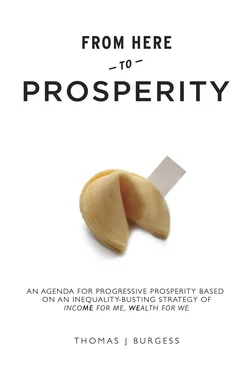A large number of people are under constant pressure to make ends meet; there is no spare cash to save and little prospect of financial security. It need not be like this. The reduction in disposable income for many is a direct result of government action. Budget cutbacks are creating a new group of people, the ‘new insecure’. Weaker life-chances, lack of opportunity and increasing insecurity are no longer afflicting only the most excluded groups. Declining real wages and incomes means more people are suffering from uncertainty. The new insecure have to cope with global economic forces and the spread of technology. They struggle to adapt to the social realities of falling living standards, feel the growing pressures of ‘earning’ and ‘caring’ in family life, and fear that life for their children will not be as good as for them in the face of pressures on pensions, access to decent health services, the costs of going to university and house price inflation.
The dominant trend in the last two decades has been towards the creation of a ‘5–75–20’ society in the developed western economies: Roughly 5% are enjoying ‘runaway’ rewards at the top, as asset prices and returns to wealth soar. This group is largely composed of professionals working in finance and property, the corporate elite and successful entrepreneurs, as well as those who inherit significant wealth.
Some 75% in the middle are either in work or have a retirement income, but are relatively insecure and often anxious about the future. Large parts of this group consists not only of ‘blue-collar’ industrial workers threatened by outsourcing to Asia, but also groups of middle-class professionals who fear their jobs will be next as the emerging ‘MINT’ economies (Mexico, Indonesia, Nigeria, and Turkey) move up the economic value chain. Once secure professionals, such as academics, mechanical engineers and scientists, who are relatively worse off than their counterparts a generation ago and may be struggling to sustain their standard of living, may also fall into this group.
The 20% at the ‘bottom’ of society struggle in a vicious cycle of low-wage, irregular work, unemployment and limited access to welfare. Arguably, they are ‘outsiders’ in the labour market and victims of entrenched social immobility. It does not take much for many families to go from a relatively well-off, comfortable existence with a bright future, to poverty. There was a moving story told by Darlena Cunha in the Washington Post in July 2014 about her experience back in 2008 as a young college educated couple who were bringing in a combined income of $120,000. They bought a house for $240,000; three weeks later it was worth $150,000. She became pregnant with twins which meant leaving her job as a TV news producer. Then, her husband lost his job. Within just two months they had gone to making just $25,000 a year, of which a large amount was going to pay the mortgage they could no longer afford. Their savings dwindled, then disappeared, and she was on welfare, Medicaid and collecting food stamps. ‘The reality of poverty can spring up quickly while the psychological effects take longer to surface,’ she said.
When you lose a job, your first thought isn’t, ‘Oh my God, I’m poor. I’d better sell all my nice stuff.’ It’s ‘I need another job.’ We didn’t deserve to be poor, any more than we deserved to be rich. Poverty is a circumstance, not a value judgment.
Six years later, they have now sold that house, her husband found a job that pays well, and they have enough left over for her to go to grad school. As she says, ‘President Obama’s programs-from the extended unemployment benefits to the tax-free allowance for short-selling a home we couldn’t afford – allowed us to crawl our way out of the hole.’ It may be a story with a happy ending but it arose from financial mismanagement – not on her part but on the banks’ – and it took much longer to reach a conclusion than it should have because of the way the recovery was handled, again not by her but by government and financial institutions.
A plane that flies too slowly will stall. An economy with slow growth will increase the concentration of wealth and make capital more dominant, according to Thomas Piketty. He adds that other things being equal, faster economic growth will diminish the importance of wealth in a society. There are, however, no ‘natural forces’ pushing against the steady concentration of wealth; only a burst of rapid growth (from technological progress or rising population) or government intervention can be counted on to keep our economies from drifting into patrimonial capitalism, an economy driven entirely from the top. Piketty recommends that governments step in now, by adopting a global tax on wealth, to prevent soaring inequality contributing to economic or political instability further down the road. In the 18th and 19th centuries western European society was highly unequal. Private wealth dwarfed national income and was concentrated in the hands of the rich families who sat atop a relatively rigid class structure. This system persisted even as industrialisation slowly contributed to rising wages for workers. Although the Great Depression and two world wars that bracketed it disrupted this pattern, a combination of taxes and the creation of the welfare state ushered in a period in which both income and wealth were distributed in relatively egalitarian fashion. On many measures, however, Piketty reckons that the wealth gap is returning to levels last seen before the First World War.
Not only is economic growth dismally slow and well behind our true capability, our infrastructure is crumbling. In the USA, total public spending on transport and water infrastructure has fallen steadily since the 1960s and now stands at 2.4% of GDP. Europe, by contrast, invests 5% of GDP in its infrastructure, while China is racing into the future at 9%. America’s spending as a share of GDP has not come close to European levels for over 50 years. Although it still builds roads with enthusiasm, according to the OECD’s International Transport Forum, the USA spends considerably less than Europe on maintaining its roads. In 2006 America spent more than twice as much per person as Britain on new construction; but Britain spent 23% more per person maintaining its roads. From personal experience, the UK may have potholes and cracks thanks to its changeable weather, but the roads in California seem no better.
There is little relief either for the weary traveller on America’s rail system. The absence of true high-speed rail is a continuing embarrassment to the nation’s rail advocates. America’s fastest and most reliable line, the north-eastern corridor’s Acela, averages a sluggish 70 miles per hour for the 454 miles between Washington and Boston so it is not technically a high speed train by European standards. The French TGV from Paris to Lyons runs at an average speed of 140mph. America’s trains are not just slow; they are late. Where European passenger service is punctual around 90% of the time, American short-haul service achieves just a 77% punctuality rating. Long-distance trains are even less reliable. But while the Federal Government seems to understand the necessity of the rail network as it allocated $8 billion for high-speed rail projects as part of the 2009 stimulus, at least three states (Florida, Ohio and Wisconsin) sent the funds back, claiming it was wasteful spending.
This is born out by recent personal experience, travelling on the regular regional Amtrak service from New York to Boston. The train was two hours late leaving New York so in the end it took over seven hours instead of four and half (which would be an average speed of 60 mph) to cover the 265 miles. The week before I was on a train from London to Preston, 225 miles, it took 2 hours 10 minutes, and arrived on time, averaging over 100 mpg). Now, I am lot letting the rail system in the UK off the hook because it leaves a lot to be desired. The system is crowded, and also suffers from delays, and it has just 68 miles of high speed line, one of the lowest in Europe.
Читать дальше












